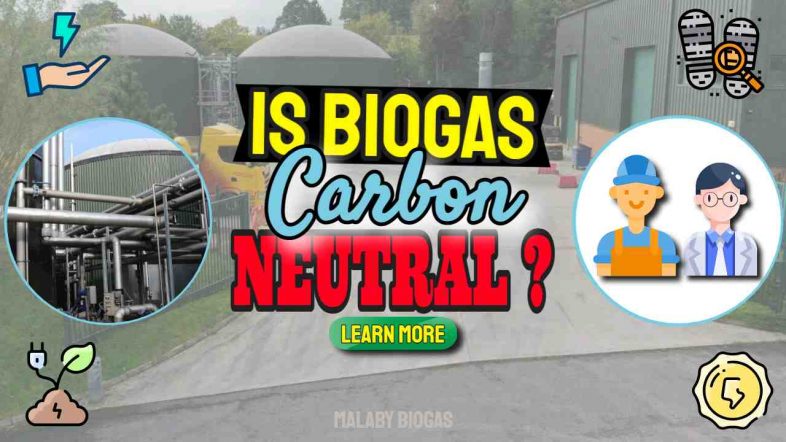Is biogas carbon neutral? Is easy to answer, and the short answer is “Yes”! The really interesting question though is what is the overall carbon footprint? Done well biogas production actually reverses the process leading to climate change.
While biogas combustion, like natural gas combustion, creates carbon dioxide (CO2), a greenhouse gas, the carbon in biogas originates from plant matter that has fixed CO2 from the atmosphere in the recent past. As a result, biogas production is carbon-neutral.
The AD process creates carbon dioxide which would be created anyway by the rotting process, even if no biogas had been made from that plant matter. It is merely part of a cycle that has been repeated untold numbers of times across aeons of time and does not contribute to the emission of greenhouse gases.
The problem of greenhouse gas accumulation in the atmosphere only occurs when methane, which has been safely locked up in the earth's crust, is released through burning fossil fuels.

Biogas is Carbon Neutral But is the Same True for Biogas Utilisation?
We can confidently report that biogas carbon is neutral, but the really Important question lies in identifying and maximising the potential for GHG emissions savings from biogas utilisation.
After all carbon neutrality gets us nowhere in the fight against climate change. The biogas industry will need to do a lot better than that if it is going to help reduce carbon emissions.
The anaerobic digestion process which produces biogas has the potential to create a “carbon footprint” of fossil fuel energy uses which when all are added up acts against the in-built GHG neutrality of this gas. It is the magnitude of that footprint, which must be kept as low as possible for maximum GHG reversal benefits.
Watch our video below for our introduction to this topic:
Assessing the magnitude of the “carbon footprint” (the non-renewable energy uses which themselves contribute to atmospheric GHGs) is a complex calculation requiring the crunching of the data from some of the best biogas plants.
That's why we are pleased to reproduce the ADBA Press Release below, which highlights recent research by Bath University, as follows:
Academic paper highlights AD's current and future carbon footprint
Bath University’s recent paper identifies the potential for GHG emissions savings from biogas utilisation.
In Wiltshire, Malaby Biogas’s Bore Hill Farm Biodigester was the case study in a research project published by Bath University and supported by Supergen Bioenergy Hub.
Using real-world data from 2019, the paper sets out the opportunity for massively improving the climate benefits of recycling food waste to produce renewable energy and green fertiliser for farmers.
Previous work established the carbon negative position of the business and this paper now sets out the additional greenhouse gas savings that could arise from future activities.
This showcases the importance of anaerobic digestion (AD) as a vital player in addressing the Climate Emergency.
With a lack of policy support in the draft Environment Bill and ELMS as well as perpetual delays in the Waste and Resources Strategy rollout, AD is the unsung hero of the UK renewables boom.
It provides renewable energy 24/7/365 compared to seasonal and daily intermittency from other more popular renewables as well as addressing other hard to decarbonise sectors:
- green fuel production,
- decarbonising the gas network,
- reducing farmers’ reliance on fossil fuels,
- improving soils and recycling the wastes that society generates.
Using Malaby Biogas’s operational data, Bath’s paper was able to show that in 2019 Malaby Biogas saved around 2,000 tonnes of CO2. More importantly, the study went on to identify that it had the potential to double it by refining the biogas into biomethane.
The report is a springboard for innovation and further studies stating that further increases may be possible by capturing biogenic CO2. That being CO2 extracted in the process as well as using that renewable gas specifically as a diesel alternative for transport in community and heavy haulage transport where electrification is not possible.
Biomethane is the only renewable gas currently available on a commercial scale.
Malaby Biogas is looking at innovations to showcase and deliver ‘gas switching’. In the run-up to COP26, the University of Bath’s study not only sets out what is happening but most importantly what could happen to make the UK a leader in innovation and delivery of creative solutions.
Providing evidence of Climate Action is critically needed and what Malaby Biogas is planning in Wiltshire is evidence of this.
“The AD industry is part of the secret war tackling climate change.”
Says Thomas Minter, Malaby Biogas director:
“I often introduce our team as foot soldiers – down in the trenches getting the job done on a daily basis. Bath University’s research not only validates those efforts but reinforces our vision to improve our already fantastic carbon credentials.”
Bath’s paper confirms Malaby’s work already delivers 2,000 tonnes net GHG savings a year and it crucially provides evidence to drastically improve the story to almost 8,000 tonnes by:
- switching from power generation to gas production and
- capturing most of the biogenic carbon dioxide.
As the government’s solar and wind-focussed policy aims to deliver green power so biogas switching to green fuel can deliver emissions savings now ahead of the long-promised hydrogen solution after 2035.
Thomas Minter:
“We already deliver carbon benefit and are now taking action to produce carbon-negative fuel for lorries. With COP26 looming, showcasing, and supporting real action is critical and Bath’s study gives us compelling evidence to act. Establishing a value for carbon savings through the new UK Emissions Trading Scheme is essential to fund decarbonisation based on a polluter pays principle. Why should we take all the risk to decarbonise while polluters are free (and often subsidised) to continue business as usual?
Making a carbon trading scheme accessible to all sectors and at all scales will help drive the change we urgently need. As we adapt to a post-Brexit, post-pandemic world, climate change really is the fundamental issue of our time and I hope the UK will act with the same urgency to deliver, not just promise, that we at Malaby are demonstrating. There is greater ambition coming from global governments and many of us are and have been, taking action.
We need continued, clear and long-term support from the UK government to deliver the ambitions now.”
www.malabybiogas.com.
For further information, contact:
For Malaby Biogas:
Thomas Minter – Director
thomasminter@malabybiogas.com
For Bath University:
Press office
press@bath.ac.uk
+44 (0)1225 386319.
PR ENDS


